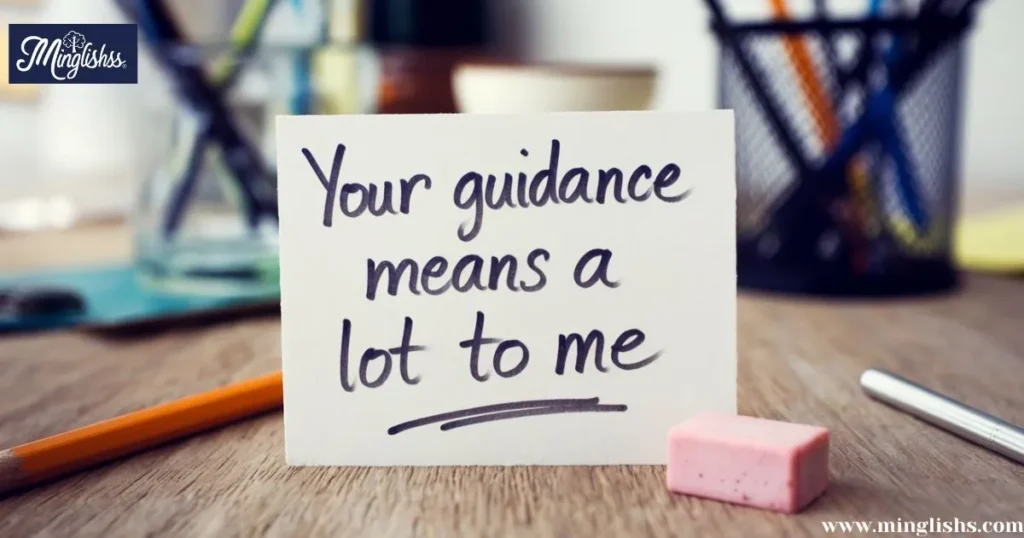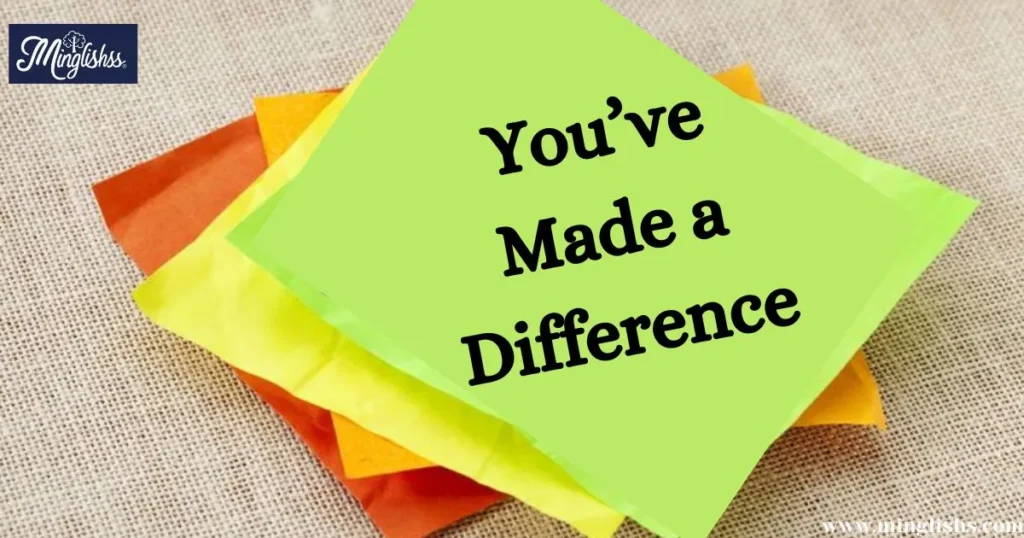“Thank you for your valuable insights!”
In our daily lives, we often find ourselves seeking advice from friends, family, or colleagues. When someone shares their thoughts or suggestions, it’s important to express gratitude. Saying “thank you” is a simple way to acknowledge their help. However, sometimes we want to mix it up and express our appreciation in more creative or personalized ways. This blog will explore various alternatives to the standard “thank you for your advice.”
In this blog, you will discover 35 different phrases and expressions to show your appreciation for advice received. Each suggestion will be accompanied by a scenario to illustrate how it can be used effectively in different contexts. The goal is to help you find the perfect way to express gratitude that suits your situation and relationship with the advisor.
Moreover, this guide will provide you with valuable tips and insights on using these expressions appropriately. Understanding the nuances of gratitude will enhance your communication skills and strengthen your relationships, whether in a personal or professional setting. Let’s dive in and explore the many ways to say “thank you” for the advice you receive!
Alternative Ways to Express Gratitude for Advice
1. I Really Appreciate Your Insight
Scenario: Jane has been struggling with a work project. After discussing her challenges with her mentor, she feels relieved and more confident.
Subject Explanation: Jane thanks her mentor by saying, “I really appreciate your insight.” This phrase shows that she values the guidance provided.
Additional Tip: Use this expression when you want to emphasize the significance of the advice in overcoming a specific issue.
2. Your Guidance Means a Lot to Me

Scenario: After a challenging breakup, Tom talks to his friend about his feelings. His friend gives him solid advice on coping.
Subject Explanation: Tom responds with, “Your guidance means a lot to me.” This expression conveys deep appreciation for the friend’s support.
Additional Tip: This phrase works well in emotional situations where the advice has a significant impact on your well-being.
3. Thanks for Your Perspective
Scenario: During a team meeting, Sarah suggests a different approach to a project. Afterward, her colleague acknowledges her contribution.
Subject Explanation: “Thanks for your perspective” highlights the value of viewing the situation from another angle.
Additional Tip: Use this phrase in professional settings to recognize diverse viewpoints that enhance decision-making.
4. Your Advice Was Just What I Needed
Scenario: Michael feels lost in his career path. After talking to a career counselor, he feels more directed.
Subject Explanation: By saying, “Your advice was just what I needed,” Michael expresses how timely and relevant the advice was.
Additional Tip: This is perfect for situations where the advice directly addresses an urgent need or concern.
5. I’m Grateful for Your Suggestions
Scenario: Emily is planning a vacation and seeks input from a travel enthusiast friend.
Subject Explanation: She tells her friend, “I’m grateful for your suggestions,” acknowledging the effort put into providing helpful options.
Additional Tip: Use this phrase when the advisor has spent time crafting specific suggestions or plans for you.
6. I Value Your Input
Scenario: After receiving feedback from her boss on a presentation, Lisa reflects on the insights given.
Subject Explanation: “I value your input” signifies respect for the boss’s expertise and willingness to improve.
Additional Tip: This is a great way to show appreciation in professional environments, especially when feedback is constructive.
7. Thank You for Your Thoughtful Advice
Scenario: Kevin is unsure about a big decision and consults his mother, who provides detailed guidance.
Subject Explanation: Kevin expresses his gratitude by saying, “Thank you for your thoughtful advice,” acknowledging her careful consideration.
Additional Tip: Use this when the advice requires deeper thought, highlighting the advisor’s effort to be considerate.
8. I Appreciate Your Honesty
Scenario: Anna seeks feedback on her writing from a peer who offers candid critique.
Subject Explanation: Anna responds with, “I appreciate your honesty,” indicating that she values straightforward and truthful advice.
Additional Tip: This expression is particularly useful when the advice is tough to hear but necessary for growth.
9. You’ve Helped Me See Things Differently
Scenario: During a discussion about a complex issue, James offers a new angle that changes Emily’s view.
Subject Explanation: Emily thanks him by saying, “You’ve helped me see things differently,” acknowledging the transformative nature of the advice.
Additional Tip: Use this phrase to emphasize the impact of advice on your perception and understanding.
Other Ways to Say Thank You for Your Reply
10. Your Support is Appreciated
Scenario: While preparing for an interview, Rachel receives guidance from a friend.
Subject Explanation: She says, “Your support is appreciated,” showing gratitude for not just advice but the overall encouragement provided.
Additional Tip: This phrase is versatile and works well in various contexts, from personal to professional.
11. I’m Thankful for Your Guidance
Scenario: After navigating a difficult situation at work, Mark reflects on his manager’s advice.
Subject Explanation: He tells his manager, “I’m thankful for your guidance,” expressing gratitude for the help during tough times.
Additional Tip: Use this phrase when the guidance has been pivotal in overcoming obstacles.
12. I Learned a Lot from Our Conversation
Scenario: After a lengthy discussion about life choices, Sarah feels enlightened.
Subject Explanation: She states, “I learned a lot from our conversation,” which not only thanks the advisor but also recognizes their knowledge.
Additional Tip: This works well in educational settings or mentoring relationships, emphasizing growth.
13. Your Thoughts Were Invaluable
Scenario: After a brainstorming session, Emily acknowledges her team’s contributions.
Subject Explanation: She says, “Your thoughts were invaluable,” highlighting how crucial their ideas were to the project.
Additional Tip: This phrase suits collaborative environments, reinforcing the value of teamwork.
14. Thank You for Taking the Time to Help Me
Scenario: Laura approaches a colleague for advice on handling a client issue.
Subject Explanation: After receiving guidance, she expresses, “Thank you for taking the time to help me,” recognizing the effort involved.
Additional Tip: Use this when someone has dedicated time specifically for your benefit.
15. I Appreciate Your Time and Effort
Scenario: After a long discussion about career goals, Sam feels enlightened by his mentor’s insights.
Subject Explanation: He thanks his mentor, saying, “I appreciate your time and effort,” acknowledging both the duration and quality of the guidance.
Additional Tip: This phrase shows respect for the advisor’s investment in your development.
16. Your Feedback is Very Helpful
Scenario: After submitting a draft, Jessie receives constructive criticism from a peer.
Subject Explanation: She replies, “Your feedback is very helpful,” acknowledging how the insights will improve her work.
Additional Tip: Use this in academic or professional contexts to show openness to improvement.
17. I Can’t Thank You Enough for Your Help
Scenario: After overcoming a personal challenge, Tim reflects on his friend’s support.
Subject Explanation: He expresses gratitude by saying, “I can’t thank you enough for your help,” which emphasizes deep appreciation.
Additional Tip: This phrase conveys strong emotions and is suitable for significant support received.
18. You’ve Made a Difference

Scenario: After navigating a tough decision, Lily acknowledges the role her sister played in the process.
Subject Explanation: Lily says, “You’ve made a difference,” which shows recognition of the positive impact the advice had on her situation.
Additional Tip: This phrase is impactful and highlights the tangible results of the advice received.
19. Your Wisdom is Appreciated
Scenario: During a family gathering, Sarah receives life advice from her grandmother.
Subject Explanation: She says, “Your wisdom is appreciated,” acknowledging the depth of knowledge passed down.
Additional Tip: This expression is respectful and works well in family or mentoring contexts.
20. Thanks for Being There for Me
Scenario: Following a stressful week, Josh confides in his best friend who provides comfort and advice.
Subject Explanation: Josh expresses gratitude by saying, “Thanks for being there for me,” emphasizing emotional support.
Additional Tip: This phrase is personal and fitting for close relationships.
21. Your Suggestions Have Been Enlightening
Scenario: In a professional workshop, participants share insights on a complex topic.
Subject Explanation: One participant acknowledges another by saying, “Your suggestions have been enlightening,” indicating the positive impact of shared knowledge.
Additional Tip: Use this in settings where collaboration leads to valuable insights.
22. I’m Grateful for Your Support
Scenario: After a challenging health issue, Nicole talks to a friend who offers encouragement and practical advice.
Subject Explanation: Nicole says, “I’m grateful for your support,” reflecting the importance of emotional and practical assistance.
Additional Tip: This is effective when both emotional and tangible help is provided.
23. I Appreciate Your Kindness

Scenario: After receiving helpful advice from a neighbor, Jamie wants to show gratitude.
Subject Explanation: Jamie expresses, “I appreciate your kindness,” acknowledging not just the advice but the neighbor’s generous nature.
Additional Tip: Use this when the advisor’s approach is particularly warm or considerate.
24. Your Insights Are Always Valuable
Scenario: After a project meeting, a team member frequently offers smart suggestions.
Subject Explanation: The project leader says, “Your insights are always valuable,” reinforcing appreciation for ongoing contributions.
Additional Tip: This works well in professional settings where consistent support is received.
25. I’m Thankful for Your Supportive Words
Scenario: Following a disappointing event, Lisa finds comfort in her friend’s words.
Subject Explanation: She states, “I’m thankful for your supportive words,” emphasizing the importance of emotional encouragement.
Additional Tip: Use this in personal relationships where emotional support is key.
26. Your Experience is Inspiring
Scenario: While discussing career paths, a colleague shares their journey.
Subject Explanation: One colleague responds, “Your experience is inspiring,” recognizing the motivational aspect of the shared advice.
Additional Tip: This is useful in mentorship scenarios where personal stories lead to guidance.
27. Thank You for Your Consideration
Scenario: After receiving feedback on a project proposal, Janet acknowledges her supervisor.
Subject Explanation: She says, “Thank you for your consideration,” which appreciates the thoughtful evaluation of her work.
Additional Tip: Use this in formal settings to convey respect for the advisor’s careful thought process.
28. You Always Know Just What to Say
Scenario: After a tough week, Mia receives comforting advice from her mother.
Subject Explanation: Mia replies, “You always know just what to say,” highlighting the mother’s intuition and understanding.
Additional Tip: This works well in familial relationships where emotional insight is valued.
29. Your Support is a Blessing
Scenario: Following a significant life change, a friend provides emotional and practical support.
Subject Explanation: The individual expresses, “Your support is a blessing,” indicating deep appreciation for the help received.
Additional Tip: This phrase is suitable for situations where support feels particularly meaningful.
30. I Value Our Conversations
Scenario: During a coffee chat, two friends discuss life challenges and share advice.
Subject Explanation: One friend thanks the other by saying, “I value our conversations,” highlighting the importance of their discussions.
Additional Tip: Use this phrase to reinforce the significance of ongoing dialogues in relationships.
31. Your Advice Has Been Invaluable
Scenario: After implementing suggestions at work, a team member expresses gratitude to a colleague.
Subject Explanation: They say, “Your advice has been invaluable,” emphasizing the critical role of the insights provided.
Additional Tip: This is particularly effective in work environments where contributions directly impact outcomes.
32. You’re Always So Supportive

Scenario: After a difficult decision, a person receives unwavering support from a close friend.
Subject Explanation: They express, “You’re always so supportive,” recognizing the consistent nature of the friend’s help.
Additional Tip: This phrase reinforces the importance of reliability in relationships.
33. Thank You for Your Expertise
Scenario: During a consultation, a doctor offers valuable health advice.
Subject Explanation: The patient replies, “Thank you for your expertise,” acknowledging the professional’s knowledge and skill.
Additional Tip: Use this phrase in formal contexts where expertise is a key component of the advice given.
34. Your Kind Words Have Encouraged Me
Scenario: After receiving praise and advice from a mentor, a mentee feels motivated.
Subject Explanation: The mentee says, “Your kind words have encouraged me,” highlighting the motivational aspect of the mentor’s advice.
Additional Tip: This works well in mentorship scenarios where encouragement is significant.
35. I’m Lucky to Have You in My Corner
Scenario: After a challenging project, a team member expresses gratitude to a supportive colleague.
Subject Explanation: They say, “I’m lucky to have you in my corner,” emphasizing the feeling of having strong support.
Additional Tip: Use this phrase when expressing gratitude in close professional or personal relationships.
Pros and Cons of Expressing Gratitude for Advice
Pros
- Strengthens Relationships: Showing appreciation can deepen connections with others.
- Encourages Future Support: Acknowledging help can lead to more frequent advice in the future.
- Boosts Morale: Expressing gratitude can make both parties feel valued and respected.
- Promotes Positivity: Gratitude fosters a positive environment, whether at home or work.
Cons
- Overused Phrases: Sometimes, traditional phrases may feel insincere if repeated too often.
- Cultural Differences: Not everyone expresses or interprets gratitude the same way.
- Expectations: Regularly expressing thanks may set an expectation for continued support, which can be burdensome.
Conclusion
Expressing gratitude for advice is an essential part of nurturing relationships. By using various phrases to say “thank you,” you can personalize your appreciation and create a deeper connection with others. Whether in personal or professional settings, showing gratitude fosters an environment of support and encouragement.
With these 35 expressions and insights, you are now equipped to communicate your appreciation effectively. Remember, gratitude goes a long way in building lasting relationships and encouraging open communication. So, the next time someone offers their advice, consider using one of these phrases to show your appreciation!
Answer to key questions
1. Why is it important to express gratitude for advice?
Expressing gratitude for advice helps strengthen relationships, fosters a positive environment, and encourages open communication. It shows that you value the other person’s input and support, which can lead to more meaningful interactions in the future.
2. What are some creative ways to say thank you for advice?
You can personalize your gratitude by writing a thank-you note, giving a small gift, or verbally expressing your appreciation in a heartfelt manner. Using specific phrases that highlight how the advice impacted you can make your thanks feel more genuine.
3. Can expressing gratitude improve professional relationships?
Absolutely! In professional settings, expressing gratitude can enhance teamwork, build trust, and create a supportive atmosphere. When colleagues feel appreciated, they are more likely to offer their assistance and collaborate effectively.
4. How can I express gratitude if I don’t feel comfortable doing so in person?
If in-person expression feels uncomfortable, consider sending a heartfelt email or a text message. You can also write a note or card to convey your appreciation, ensuring that your gratitude is communicated even if it’s not face-to-face.
5. Is it possible to overdo expressions of gratitude?
While expressing gratitude is generally positive, overdoing it can sometimes make your appreciation feel insincere or obligatory. It’s essential to be genuine and selective in your expressions of thanks, ensuring that they come from a place of true appreciation rather than routine.

I’m Jane Austen, a language expert at Minglishs, dedicated to helping learners master English through engaging and accessible content. My passion for literature and teaching drives me to make language learning both enjoyable and effective.










